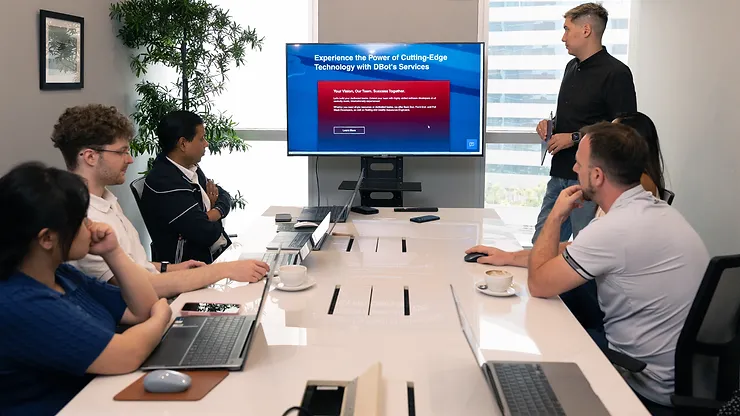In today’s hyper-competitive digital landscape, US businesses face mounting pressure to innovate quickly while managing costs effectively. As development expenses continue to rise domestically and talent shortages persist, forward-thinking companies are exploring strategic software outsourcing options beyond traditional destinations. One country is emerging as a particularly attractive solution: Thailand.
The Shifting Landscape of Global Software Outsourcing
The global software outsourcing market is projected to reach $425.19 billion by 2026, with Asia continuing to lead as the preferred region for quality development at competitive rates. While India and China have dominated this space for decades, US businesses are increasingly diversifying their outsourcing portfolio to include emerging tech hubs that offer unique advantages.
Thailand, with its robust digital infrastructure, growing tech talent pool, and strategic location, has quietly become one of these rising stars in the software development outsourcing world. For US companies looking to gain a competitive edge, understanding what makes Thailand special could be the key to successful digital transformation in 2025 and beyond.
Why Thailand Makes Strategic Sense for US Companies
- The “Goldilocks Zone” of Quality and Cost
US businesses often find themselves torn between premium-priced domestic development and budget offshore options that may compromise quality. Thailand occupies a sweet spot in this spectrum:
- Development costs 50-70% lower than US rates
- Higher English proficiency than many Asian competitors
- Strong technical education system producing 40,000+ IT graduates annually
As one CTO noted: “With our Thai partners, we’re getting San Francisco-quality code at a fraction of the cost.”
Thailand vs. Traditional Outsourcing Destinations: At-a-Glance Comparison
| Factor | Thailand | India | China | Vietnam | US Domestic |
|---|---|---|---|---|---|
| Avg. Hourly Rate | 35−55 | 25−50 | 40−70 | 20−40 | 100−200 |
| English Proficiency | High (Business) | Moderate | Low-Moderate | Moderate | Native |
| Time Zone (vs. EST) | 11-12 hrs ahead | 9.5-10.5 ahead | 12-13 hrs ahead | 11-12 hrs ahead | Same |
| Tech Talent Pool | 40k+ graduates | 1.5M+ graduates | 500k+ graduates | 50k+ graduates | 150k+ graduates |
| Cultural Alignment | High | Moderate | Low | Moderate | Native |
| IP Protection | Strong | Moderate | Moderate | Emerging | Strong |
Key Service Areas Where Thai Developers Excel
- Custom Enterprise Software Development
Thai firms excel at building:
- ERP/CRM systems (Custom Software Development)
- Supply chain solutions (Industry-Specific Software)
- Legacy system modernization (Java Modernization)
- Mobile Application Development
- Cross-platform apps using React Native/Flutter
- Mobile commerce solutions (Turn Key Development)
- AI/ML Implementation
- NLP and computer vision systems (AI-Driven Automation)
- Predictive analytics models
Spotlight: DBot Software Leading Thailand’s Tech Evolution
DBot Software, a Bangkok-based leader since 2019, exemplifies Thailand’s technical prowess. Their services align perfectly with US needs:
- Frontend/Backend: React.js, Java, .NET Core
- Cloud Solutions: AWS, Azure (Digital Transformation)
- Team Augmentation: Dedicated Development Teams
For a comprehensive analysis of top partners, see our 2025 Guide to Thai Software Outsourcing Companies.
Effective Collaboration Models
- Project-Based Engagement
Ideal for defined initiatives - Dedicated Teams
Continuous development support - Build-Operate-Transfer
Long-term offshore centers
Conclusion: Strategic Opportunity for 2025
Thailand offers US businesses a unique blend of quality, cost efficiency, and cultural alignment. As you plan your 2025 tech strategy, explore our detailed 2025 Guide to Top Thai Software Companies to find partners that align with your needs in:
- AI-Driven Automation
- Enterprise Software Modernization
- Industry-Specific Solutions
- Custom Software Development
- Dedicated Software Development Teams
- Digital Transformation Consulting
By leveraging Thailand’s tech ecosystem through strategic partners like DBot, US companies can accelerate innovation while maintaining cost efficiency in an increasingly competitive digital marketplace.
FAQ: US-Thailand Software Development Partnerships
Thailand combines India’s cost advantages with better cultural alignment to Western business practices, offering higher English proficiency in professional settings (particularly in Bangkok’s tech sector) and less market saturation. While India has larger talent pools, Thai partners excel in personalized service and niche technical expertise, particularly in AI integration and legacy system modernization. Our 2025 Guide to Thai Outsourcing Companies details these competitive advantages.
Leading firms employ Agile methodologies enhanced by AI-driven QA processes, including automated testing frameworks, mandatory peer code reviews, and performance benchmarking tools. Many now integrate AI-powered quality assurance pipelines that predict errors before deployment, achieving defect rates comparable to US teams (under 0.5% per KLOC).
Top Thai partners mitigate this through bilingual project managers, real-time collaboration tools like Slack/MS Teams, and daily standup reports synced to US time zones. Most Bangkok-based companies maintain 4-hour daily overlap with EST for urgent consultations, while asynchronous workflows handle routine updates.
Reputable providers implement NDAs compliant with both Thai and US law, role-based access controls, and secure cloud repositories with activity logging. Many offer optional code escrow services through third-party US custodians, providing an extra layer of protection for sensitive projects.
From kickoff to delivery, most projects follow a 16-28 week timeline: 1-2 weeks for requirements gathering, 1-3 weeks for team assembly, 4-8 weeks for MVP development, and 10-15 weeks for full implementation. Turn Key Development partners can accelerate this by 30-40% using pre-configured tech stacks.
Our 2025 Guide identifies firms like DBot Software with proven US success in enterprise-scale Java modernization, AI-driven digital transformation consulting, and dedicated team models. These partners maintain US-style documentation practices and compliance expertise for sectors like fintech and healthcare.
The government’s $1.6B Digital Economy initiative is fueling growth in blockchain supply chain solutions, AI-powered healthcare platforms, and green software engineering – all areas where Thai developers are building globally competitive expertise. Bangkok is emerging as a metaverse development hub, with several firms already delivering AR/VR projects for US clients.






